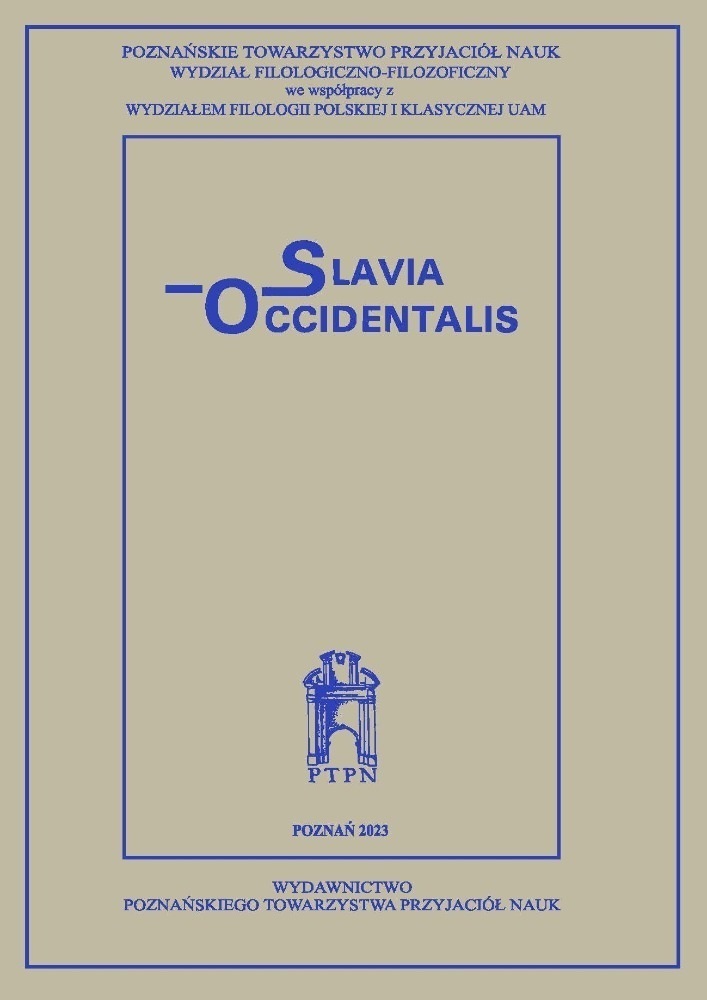Abstract
The article presents linguistic phenomena from the initial stage of the poet’s work when the modernist writing model prevailed. Leopold Staff wrote a reflexive and descriptive triptych in which, by resorting to a juxtaposition to the Young Poland movement poetry, he created paradise landscapes of a deserted island surrounded by sea water, drowned in light and colour. In order to recreate the protagonist’s dreams he resorted to poetic imagery at various levels of text organization. The linguistic phenomena in the realm of syntactic forms refer to the functions of exclamations, hypotaxis and parataxis, the role of arrangements of conjugation rows, the rhythm of verses combined in a hendecasyllable with ABBA rhymes. The following figures of speech were used: antithesis, rhetoric questions, inversions, apostrophes etc. As for semantic transformations, an important role was played by sensual and mental metaphors, semantic poetism, personification and comparisons. The lexical phenomena were related to applying the style-related function of vocabulary that is chronologically diverse (artistic neologisms, neo-semantisms, old-fashioned words); geographically diverse (dialects) and word-formation diverse (derivatives of adpositional phrases in order to condense the text to hendecasyllable verses).
References
Staff L., 1967, Poezje zebrane, t. 1, Warszawa.
Bartmiński J., Niebrzegowska S. (red.), 1999, Słownik stereotypów i symboli ludowych. Kosmos.
Ziemia, woda, podziemie, t. 1, cz. 2, Lublin, s. 381.
SJPD – Słownik języka polskiego, red. W. Doroszewski, t. 1–11, Warszawa 1958–1969.
SW – Słownik warszawski – J. Karłowicz, A. Kryński, W. Niedźwiedzki, Słownik języka polskiego, t. 1–8, Warszawa 1900–1927.
Białoskórska M., 2007, Porównania w Ścieżkach polnych Leopolda Staffa, „Studia z Filologii Polskiej i Słowiańskiej” 42, s.19–36.
Białoskórska M., 2010, Językowo-kulturowa kreacja skowronka w „Pieśni o skowronku” Leopolda Staffa, „Poznańskie Studia Językoznawcze. Seria Językoznawcza” 16, s. 21–30.
Białoskórska M., 2010, Słownictwo osobliwe w „Ścieżkach polnych” Leopolda Staffa, „Studia z Filologii Polskiej i Słowiańskiej” 451, s. 7–25.
Brzozowski S., 1965, Leopold Staff, w: Leopold Staff, oprac. I. Maciejewska, Warszawa.
Kulawik A.,1994, Poetyka. Wstęp do teorii dzieła literackiego, (wyd. 2 popr.), Kraków.
Kurkowska H., Skorupka S., 1959, Stylistyka polska. Zarys, Warszawa.
Kwiatkowski J., 1966, U podstaw liryki Leopolda Staffa, Warszawa.
Maciejewska I., 1965, Leopold Staff, Warszawa.
Skubalanka T., 1995, O stylu poetyckim i innych stylach języka, Lublin.
